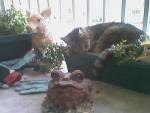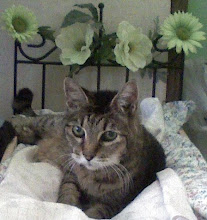KITTEN OR CAT?
There is nothing more adorable, sweet, or entertaining as a kitten. However, depending on your needs and your home (other family members and other pets), you may for whatever reason decide to get an adult cat. Whether it is a kitten or an adult cat that you choose, please keep in mind that there are wonderful companions at every animal shelter just waiting to become a part of your life and the lives of those around you. Please consider visiting your shelter to save a life while also enriching yours.
A WORD BEFORE WE GO ON
Over the course of 40 years, I have been learning more and more about holistic medications and treatments and holistic preventive health care for myself, and therefore, over a period of time, I have come to have the same concerns and considerations for my furry friends as well. I haven't been sorry. I am now living with the oldest - and sweetest! - cat I've ever had or known. That being said, some of my recommendations may sound careless or neglectful to the onlooker who hasn't researched the issues, but know that I did not arrive at these ideas because they are easier, simpler, or cheaper for me nor am I neglectful in any way. I like to read and know about any health issues, medications, nutrition, or treatments out there - for me or my pets - and therefore, anything that I suggest here has been researched. All of it is a matter of personal choice, of course, but I will share what I know and why I have made the choices I've made.
BEFORE YOU ADOPT OR BUY
You will need a litterbox for each cat in your household. Purchase litter. Clay, unscented litter is the healthiest for you and your pet. Plan on just dumping the entire litterbox and lining it with several layers of fresh newspaper (Sundays are the perfect schedule for this task since the Sunday newspaper will still be in your home and ready for recycling) each week. I don't like the idea of "scoopable" or "clumpable" litter. Think about this for a moment. It may be easier for us humans to just keep reusing litter, but how healthy is it for your feline companion whose health and well-being has been entrusted to you? What kind of bacteria is lurking in the litterbox week after week after week. Clay litter - even when changed weekly - is cheaper and safer for your pet. End of story.
Get some dry and wet canned food for your companion. Just start with a good brand right off. Pay particular attention to ASH content, MAGNESIUM content, and PHOSPHORUS. Consider your cats urinary tract health and kidney health before it becomes an issue. Choose foods that say "urinary tract health" or "urinary tract maintenance" or just choose a slightly more expensive brand, and you will find lower ash and lower magnesium. Most of these more expensive brands do not even contain phosphorus or any fillers. (If you had been feeding your pet no-filler foods during the China wheat gluten pet food scare, you know what I'm talking about. No fillers, and there was no need for concern.) Free feed (leave an unlimited supply out at all times) your companion the dry food and provide canned food at least once in the morning and once at night. This provides a good balance of carbs so that you can also prevent early onset diabetes. Again, what is the old saying? "An ounce of prevention is worth a pound of cure." As a personal aside, I feed my senior cat
(15 years now and no known disease!) Wellness brand and Petguard brand foods. I get Wellness dry food and Petguard wet food. I have fed her Wellness canned food; however, she seems to prefer Petguard wet food. I cannot find the Petguard dry food in my area, but My Precious Girl is perfectly content with her Wellness dry so I'm satisfied with the choices that I have made for her.
If you have chosen a kitten, make certain to get foods specially formulated for kittens for the first one year of your companion's life. Then, after one year, you can switch to adult food.
Make sure you have dedicated bowls and dishes/plates - preferably unbreakable - for your new companion to eat dry food out of, have access to fresh water, and eat canned food from (for this, I prefer a flat dish). A weighted water bowl never hurts, either.
KITTEN- AND CAT -PROOFING YOUR HOME
Kitten-proof your home before you go get one. In fact, all of what I'm about to say here should really be applied to any pet. Make sure that your blind-pulls are up higher than Ms. Kitty can jump (and they can jump really high) to prevent accidental hanging of your new companion. Make sure that your cabinets are secured and cannot be opened when bumped into. Make sure that no chemicals or poisons of any kind - that includes plants, too, and even some foods! - are out of reach.
If you are having a problem with bugs of any kind in your home, and you have turned to the services of an exterminator or are using a spray or bombs in your home, please make sure that your bug problem is taken care of prior to bringing a new companion into your home. Chemicals of any kind are not safe for anyone or anything. Better to be safe than sorry. Once your bug problem is taken care of, and you have sent your exterminator packing, clean every baseboard, crevice, and any other common area in your home or outdoors (enclosed patio or balcony) thoroughly in an attempt to remove any unsafe chemicals and to reduce Ms. Kitty's exposure.
Get your friend a nice kitty bed, even if you plan to have your new companion sleep with you. You may be surprised at where you will find your friend sleeping. It is nice to offer at least one sensible option.
You may want to get some safe toys for your new companion, perhaps even a scratching post. A word on scratching posts: Did you know that some cats are vertical scratchers and some cats are horizontal scratchers? If you catch your kitty sharpening its nails somewhere in your home, pay attention to what it was using -- was it the arm of the sofa (from a standing position) or was it your carpeting? If it was the arm of the sofa, and your kitty was standing while scratching, go get a vertical scratching post. If it was the carpeting that kitty was using, go get a horizontal strip for your kitty's use.
YOUR OTHER CATS AT HOME
If you already have another cat at home, make sure that your new kitten or cat comes with proof of a negative feline leukemia test and first shots, at least. Also, be certain that it is free of fleas and has either been "wormed" or has had a recent stool sample test negative for intestinal parasites. So very important! Because even though you will purchase another litterbox if bringing in a new cat to your household that already has a cat, the cats will inevitably crossover when it comes to litterboxes - in the beginning, at least, and if the new cat has intestinal parasites, your other pets will become infected. That applies to your canine companions as well - - intestinal parasites are contagious by way of feces - - and if you have a dog in your home who likes to visit the kitty box occasionally, your dog is at risk as well.
YOUR DOG(S) AT HOME
I just mentioned the litterbox and parasite concern in the above paragraph so that is covered.
Otherwise, it is super simple - from a health standpoint - to bring a cat into the home that has a dog or dogs and nothing else because very few diseases or health risks are transferrable between cats and dogs. As I mentioned, fleas and ticks, of course, would be considerations. Fleas and ticks do not discrimate, and neither do intestinal parasites. So, out of respect and concern for your pets who already share your home, make sure that your new companion is pest-free and get that stool sample tested before bringing in your new companion.
Make sure that your kitten or cat has a private place - out of reach of the dog(s) - where he or she can eat and have access to fresh food and water without the dog(s) scarfing everything up when you and Ms. Kitty are not looking. I've been through this, and believe me, it is no fun! Not only will you quite possibly have a dog with gastric problems due to a sudden dietary change, but you will run out of your kitty's food so much faster. If you are like me and feeding a better brand of food, it is especially exasperating because it costs a lot more to feed a dog and your feline companion a better brand of cat food!
A WORD ABOUT DOGS AND CATS WHEN IT COMES TO FOOD
A dog can live on cat food, but a cat cannot live on dog food. If your cat is sharing a home with a dog and seems to prefer the dog food over his/her own cat food, don't laugh too much about this because a cat needs TAURINE which is in cat food but not generally in dog food.
Note: Recent research indicates that dogs' hearts benefit from TAURINE; therefore, some more advanced and progressive makers of dog food are now adding it to their dog foods; however, there is a certain amount of TAURINE required for your cat's diet. So, make sure that Ms. Kitty has a healthy cat food that it enjoys. Your cat's eyesight depends upon it. Your cat can go blind due to a TAURINE deficiency.
skip to main |
skip to sidebar


Gemini
Feline Health | Feline Diabetes | Feline Kidney Disease| Feline Liver Disease | Feline Eye Disease| Feline or Cat Upper Respiratory Infection | Feline Congestive Heart Failure | General Health Tips | Home Diagnostic Tips | Questions to Ask Your Vet | Medical Information on Medications and Procedures and Recommendations | Feline Oral Health | Feline Dental Disease | Taurine | Kitty Litter | Litterbox | Cat Food | Pet Food Recall
My Precious Girl

A Wealth of Information

Gemini